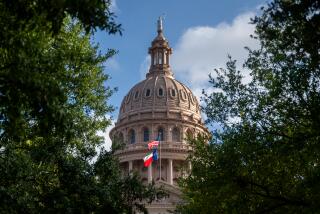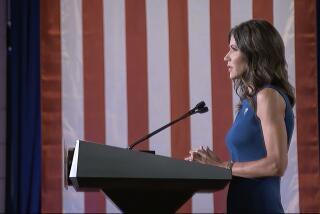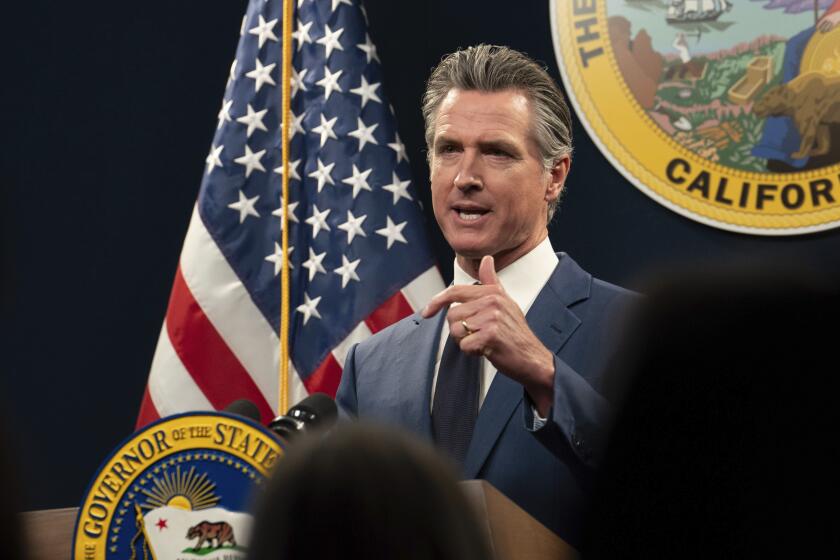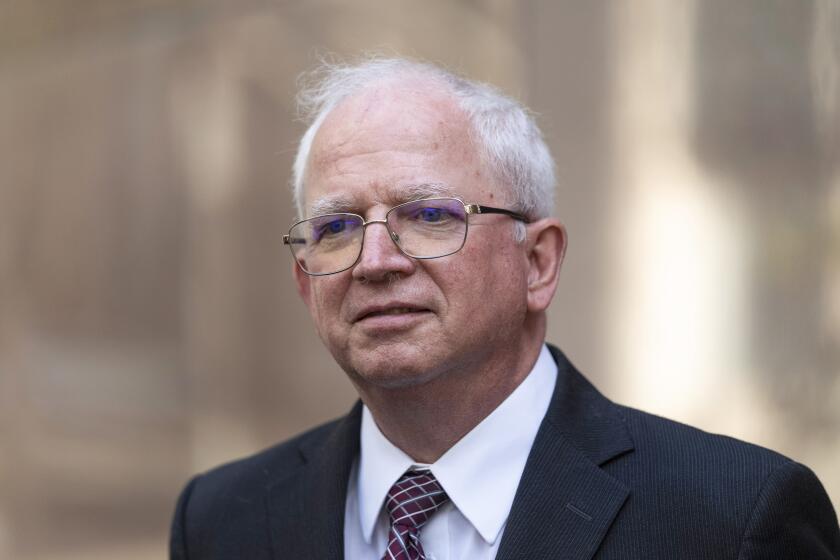As Bush Gains, Florida Democrats Losing Enthusiasm for a Rematch
No Democrats anywhere have been anticipating a rematch with President Bush more eagerly than those in Florida, the state whose bitterly contested vote finally decided the White House race three years ago.
But now that the 2004 campaign is gearing up, some Florida Democrats are concerned that none of their party’s potential nominees are up to the job of defeating the president in a state where his younger brother, Jeb Bush, won a landslide reelection as governor just 10 months ago.
“They really have to get their act together, and they don’t seem to have their act together,” said Catherine McNaught after she joined others at a gathering organized by the state party to watch last week’s nationally televised debate among the Democratic candidates. “Jeb is big down here; he’s huge ... and I don’t see that we have anybody stepping up to the plate.”
All signs suggest that Florida once again will play a pivotal role in the presidential election. Karl Rove, Bush’s chief political strategist, has already described it as “ground zero” for 2004.
Given the president’s continuing strength in the South, the Mountain West and the Plains states, many strategists in both parties believe it could be almost impossible for the eventual Democratic nominee to win an electoral college majority without capturing Florida.
But, in what’s looming as a major challenge for Democrats, Bush looks much stronger in the state than he did in 2000, when Florida symbolized the nation’s 50-50 partisan divide.
Florida’s underlying demographic and partisan balance makes it too close for either party to view it as safe in next year’s election. But when Bush visits Jacksonville and Fort Lauderdale on Tuesday, he will arrive in a state where all the key indicators show Republicans gaining strength and Democrats struggling to keep pace.
“Florida is becoming an increasingly more Republican state,” said Bob Buckhorn, a longtime Democratic activist from Tampa. “We start light-years behind the Republicans in terms of our fund-raising ability, our farm team and the technical apparatus to make this thing work. We are in a rebuilding phase -- no question about it.”
Little to Cheer About
The party’s prospects would immediately improve if Sen. Bob Graham, one of the state’s most popular politicians, succeeded in his bid for the Democratic presidential nomination. But his campaign has so far drawn little support.
Florida Democrats have had very little to cheer about since the December day in 2000 when the U.S. Supreme Court stopped the recounting of ballots in the epic struggle between Bush and Al Gore. That decision let stand a count that gave Bush a victory in Florida of 537 votes out of nearly 6 million cast -- and with it, the presidency.
The state’s Democrats have used that fierce fight as a rallying cry. But that hasn’t prevented Republicans from gaining ground on most key measures of political strength in the state since.
One basic indication is party registration. In 2000, there were 372,843 more Democrats than Republicans registered in the state; by this summer, the margin had dwindled by nearly 60,000, to 314,969.
More dramatic were the results of the 2002 election. Republicans padded their majorities in both the state House and Senate. With the help of a favorable redistricting map, they expanded their lead in the state’s 25-member congressional delegation from seven seats to 11.
And the GOP dominated the statewide elections, crushing Democrats in the contests for attorney general and agriculture commissioner, while watching Jeb Bush power to a one-sided reelection over Democratic nominee Bill McBride. Though Democrats still hold both U.S. Senate seats, the victories gave the Republicans a clean sweep of statewide executive offices.
Gov. Bush’s victory was especially emphatic. Lifted by a surge of Republican turnout, he overwhelmed McBride, a trial lawyer making his first bid for public office, by 56% to 43%, a 655,000-vote margin. Jeb Bush won nearly as many votes as his brother did in the 2000 presidential election, when overall turnout was much higher.
Almost no one in either party believes Florida will be as easy for President Bush to carry in 2004 as it was for his brother in 2002. “I don’t think any of us believe the eventual Democratic presidential nominee is going to play as weakly in Florida as Bill McBride,” said Neil Newhouse, who polled for Jeb Bush in 2002. “It is still going to be a very competitive, very difficult state.”
But the magnitude of Jeb Bush’s vote in 2002 does point to two trends that are likely to benefit the president next year.
One is the intensity of feeling among Florida Republicans for the Bush brothers. The tidal wave of GOP turnout in Florida, like similar surges last year in Colorado and Georgia, suggests that President Bush can translate his glowing approval ratings among Republicans -- which have consistently held at 90% or above -- into votes.
Perhaps even more important for 2004, the 2002 election demonstrated that Florida Republicans now exceed Democrats in the capacity to identify, contact and turn out their supporters.
In 2002, for instance, the state GOP sent every registered Republican an application to vote by absentee ballot -- and followed that with another mailing and phone calls from volunteers. The result: Jeb Bush won over 510,000 votes -- almost 200,000 more than McBride -- from either absentee ballots or theose cast in the state’s early-voting system.
By contrast, with McBride focusing his resources on television advertising, the Democratic Party didn’t receive money for its get-out-the-vote campaign until five days before election day, said Scott Maddox, the former Tallahassee mayor who became state party chairman in January.
Energetic and ambitious, Maddox is rebuilding the frayed Democratic infrastructure. He’s raised the money to open a new headquarters, expand staff and increase the party’s presence on the Internet.
Yet the Florida GOP, working closely with the 2004 Bush campaign, is already raising the bar. From its headquarters on a quiet, shady street just a few blocks from the courthouses where Bush and Gore waged war after election day in 2000, the state party has launched a program that will pay local GOP organizations $2 for every new Republican voter they register.
The other big change from 2000 is in the perception of President Bush himself. As in many states, he has benefited in Florida from a widespread belief that he’s provided strong leadership in the war on terrorism.
“If you look at his job approval ratings and how people rate the fight against terrorism, at this stage people are saying, ‘Stay the course,’ ” said Jim Kane, executive director of the nonpartisan Florida Poll.
But amid all these blue skies, some clouds still loom for the president.
Republicans worry that many of the 97,488 Floridians who voted for Green Party candidate Ralph Nader in 2000 will switch to the Democratic nominee in 2004. Election reform measures mandating the use of high-tech voting machinery in the wake of the 2000 debacle also could mean more Democratic votes, since under the old punch-card systems more ballots were often discarded for mistakes in lower-income and minority precincts.
The GOP is even more concerned about widespread complaints in the Cuban American community -- a critical bloc of support for Bush in 2000 -- that the White House hasn’t been tough enough on Fidel Castro.
Fears on Economy, Iraq
Bush is also vulnerable in Florida to the same storm winds battering him elsewhere. Though the state’s economy has performed better than most, unemployment is still higher in Florida than when Bush took office. Some observers see growing jitters over Iraq too.
Indeed, the key to Florida’s role in the presidential race may be its sensitivity to national currents. The state’s blend of African Americans, Latinos, moderate suburbanites in the Orlando-to-Tampa corridor, rural conservatives in the northwest and die-hard liberal retirees in the southeast tends to produce a remarkably accurate political microcosm of the nation.
That suggests that if Bush has a comfortable lead nationally, he’s likely to be secure in Florida as well. But that also means that if the overall race is close next year, all of the advantages Republicans have accumulated here since 2000 may not prevent Florida from again becoming a nail-biter.
More to Read
Get the L.A. Times Politics newsletter
Deeply reported insights into legislation, politics and policy from Sacramento, Washington and beyond. In your inbox three times per week.
You may occasionally receive promotional content from the Los Angeles Times.






